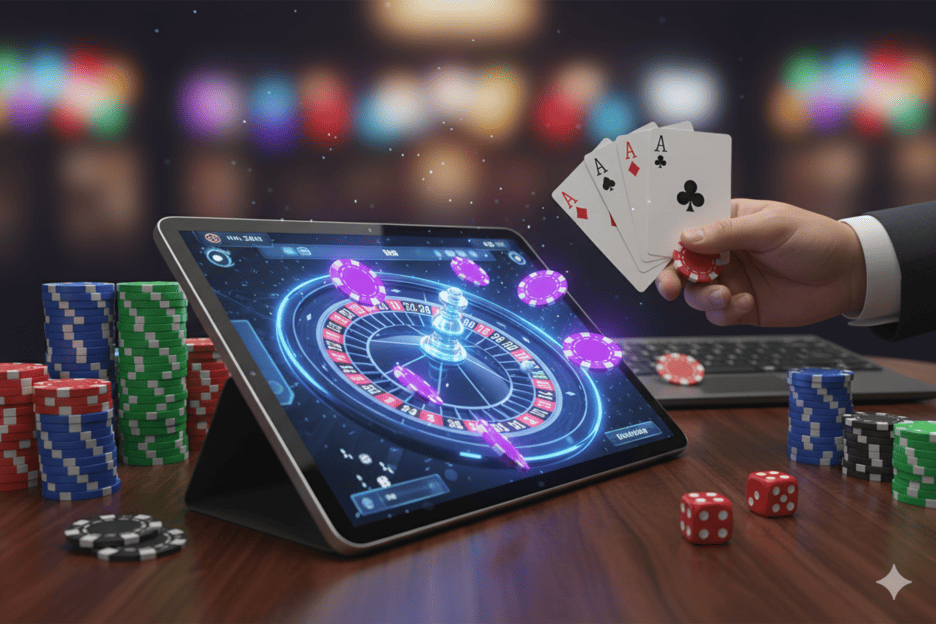
What is a Live Casino and How Does It Work
When I first logged into Dionolympos.gr, I was immediately drawn to the live casino section. Unlike traditional online casino games powered purely by random number generators, live casinos replicate the atmosphere of land-based venues with real dealers, real cards, and real tables, streamed in real time to your device. As I explored further, I realized that live casinos are far more than a visual upgrade-they represent a sophisticated intersection of streaming technology, game theory, human psychology, and digital interaction. Understanding their mechanics, infrastructure, and the player experience is crucial for anyone seeking to maximize both enjoyment and strategic advantage.
The Fundamentals of a Live Casino
What Makes it Different
A live casino differs from standard online games in that it involves human dealers managing real cards, roulette wheels, or dice. Every action is streamed in real time, allowing players to place bets and interact via a digital interface. Unlike computer-generated outcomes, each hand, spin, or roll has a tangible, physical basis, enhancing trust, engagement, and authenticity.
Core Components
The essential components of a live casino include high-definition video streams, professional dealers, a studio or casino floor, real gaming equipment, and an interactive betting interface. Advanced software synchronizes player bets with dealer actions, ensuring accurate outcomes and seamless gameplay.
The Role of the Dealer
Dealers are trained professionals who manage the game, execute bets, announce outcomes, and maintain the flow. Their performance is critical, as it shapes the atmosphere and sets the tone for interaction. Unlike automated games, dealer behavior, pacing, and communication subtly influence player decisions and perceived fairness.
Technology Behind Live Casinos
Streaming Infrastructure
High-quality live casinos rely on low-latency video streaming to deliver near-instantaneous feeds. Multiple camera angles capture the table from different perspectives, ensuring players can verify outcomes, observe dealer behavior, and experience immersive interaction. Bandwidth optimization and compression algorithms are crucial to maintain clarity without sacrificing speed.
Game Management Software
Specialized software translates player inputs into dealer-readable commands, calculates payouts, and synchronizes outcomes in real time. This layer of software bridges human action with digital interfaces, ensuring accuracy and minimizing discrepancies. Random number generators may still be used for certain elements, such as card shuffling verification, adding an additional layer of integrity.
Interactive Interface Design
Player interfaces display available bets, timers, payout tables, and chat functions. The design balances accessibility and information density, allowing for strategic decision-making without overwhelming the user. Features like auto-bet, statistics tracking, and visual cues enhance both convenience and analytical depth.
Types of Live Casino Games
Roulette
Live roulette closely replicates the physical game. Players place bets on numbers, colors, or combinations while the dealer spins the wheel in real time. Multiple camera angles and slow-motion replays enhance transparency. European, American, and French variations are often available, each with distinct house edges, and strategies can be adapted accordingly.
Blackjack
Live blackjack involves real cards dealt by a dealer with players making decisions via interface buttons. Timing, hand management, and split/double options mirror physical casinos. Advanced platforms provide statistics and odds calculations to inform strategy while maintaining real-time engagement.
Baccarat
Live baccarat emphasizes speed and elegance. Players can bet on banker, player, or tie outcomes. Side bets like pair combinations are integrated, allowing for layered strategy. Dealer professionalism and studio ambiance enhance perceived fairness and immersion.
Poker Variants
Live casino poker includes games like Texas Hold’em, Three Card Poker, and Caribbean Stud. Unlike standard online poker, live versions emphasize human behavior, psychological reads, and social interaction, requiring adaptive strategies rather than purely probabilistic approaches.
Game Shows and Hybrid Formats
Innovative live games combine casino mechanics with interactive show elements. These include spinning wheels, quiz-style betting, and gamified rewards. They are designed to maximize engagement and blur the line between entertainment and wagering.
Player Interaction and Social Dynamics
Real-Time Communication
Players can communicate with dealers via chat, emojis, or pre-set responses. This humanizes the digital experience and enhances social presence. Dealer responsiveness influences satisfaction and may subtly impact betting behavior.
Multi-Player Engagement
Tables often allow multiple players simultaneously. Observing other players’ actions creates a quasi-competitive environment, affecting decision-making, risk assessment, and perceived social norms. Strategic adaptation to table dynamics is a unique aspect of live casino play.
Community and Behavioral Factors
Players may experience community effects, such as streak perception or herd behavior. Awareness of these tendencies enables disciplined strategy, avoiding impulse-driven bets while maximizing analytical focus.
Advantages of Live Casinos
Authenticity and Trust
Seeing real cards, real dice, and human dealers reduces skepticism about fairness. Live casinos provide transparency that traditional RNG-based games cannot replicate fully, fostering confidence in outcomes.
Enhanced Engagement
The combination of social interaction, real-time action, and visual fidelity maintains attention and extends session duration. Players feel more invested emotionally and cognitively, enhancing enjoyment and perceived value.
Strategic Depth
Live formats allow for adaptive strategy, especially in games like blackjack and poker, where player observation, dealer behavior, and timing influence outcomes. This adds a cognitive layer absent in purely digital simulations.
Challenges and Limitations
Bandwidth and Latency
Optimal performance requires stable, high-speed internet. Lag, dropped frames, or synchronization errors can reduce immersion and introduce frustration. Players must balance device capabilities with platform requirements for consistent play.
Cost of Operation
Live casinos are resource-intensive. Studios, professional dealers, cameras, and streaming infrastructure require significant investment, which may limit table availability or impose higher minimum bets compared to standard online games.
Risk Management
Platform security, fraud detection, and outcome verification are critical. Live casinos must integrate multi-layered encryption, monitoring, and oversight to maintain fairness and protect both players and operators.
Online vs. Land-Based Experience
Accessibility and Convenience
Live casinos provide the atmosphere of land-based venues without geographic constraints. Players can engage from home, on mobile devices, or remotely, combining comfort with authenticity.
Atmosphere and Immersion
While live streaming replicates many sensory cues of a physical casino, some elements-ambient noise, tactile interaction, and immediate peer presence-remain unique to land-based experiences. Hybrid models may merge live streaming with physical casino access to bridge this gap.
Strategic Implications
Online live formats allow enhanced statistics tracking, session history analysis, and probabilistic modeling, offering players tools unavailable in traditional venues. Strategic depth may increase due to data integration and interface analytics.
Innovations and Future Trends
Virtual Reality Integration
By 2026, VR-compatible live casinos will allow players to explore fully immersive casino floors. Real-time dealer interactions, multiplayer tables, and spatial navigation enhance realism and strategic insight.
AI-Assisted Features
AI may provide adaptive advice, real-time probability overlays, or behavioral insights without compromising autonomy. These tools enhance decision-making, reduce cognitive load, and improve overall session quality.
Global Connectivity
Cross-platform, multilingual live casinos enable participation in international tables. Players can interact across borders, creating diverse, dynamic communities that influence game flow, pacing, and psychological dynamics.
Responsible Gaming in Live Casinos
Behavioral Monitoring
Live platforms can track session length, bet size, and patterns indicative of risk behavior. Automated alerts, cooling-off periods, and customizable limits help prevent compulsive gaming while maintaining engagement.
Transparency and Education
Live casinos often provide tutorials, real-time statistics, and probability explanations. Educated players can make informed decisions, improving both enjoyment and risk management.
Session Management Tools
Features like time reminders, deposit limits, and self-exclusion options are integrated directly into interfaces. Players are empowered to regulate exposure, maintaining long-term engagement without compromising safety.
Expert Tips for Live Casino Play
Optimal Session Timing
Selecting periods of high focus and low fatigue improves decision-making, especially in strategic games like blackjack or poker. Mid-morning or early evening often aligns with peak cognitive performance.
Bankroll Allocation
Treat live tables as distinct from standard online games. Allocate funds according to risk tolerance, game type, and session duration to maximize engagement while minimizing impulsive loss chasing.
Observation and Adaptation
Monitor dealer behavior, table dynamics, and other players’ patterns. Subtle insights inform betting decisions, allowing adaptive strategies that exploit social and probabilistic nuances.
Platform Familiarization
Before high-stakes play, explore interface features, betting tools, and statistics panels. Understanding the technical ecosystem reduces errors and enhances strategic execution.
Conclusion
A live casino is a sophisticated, hybrid environment combining human interaction, real gaming equipment, and advanced streaming technology. Platforms like Dionolympos.gr provide authentic experiences that replicate land-based venues while integrating analytics, convenience, and accessibility. Understanding the mechanics, strategic implications, and technological infrastructure of live casinos allows players to maximize enjoyment, maintain responsible gaming habits, and engage with complex probabilistic scenarios in real time. From roulette to poker, live casinos merge excitement, transparency, and social interaction into an immersive digital ecosystem that represents the future of online gambling. By mastering timing, interface use, and adaptive strategy, players can approach live casinos with confidence, insight, and enhanced engagement, making the experience both entertaining and intellectually rewarding.

Leave a Reply